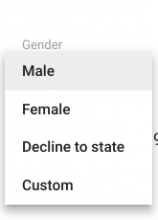One of Promo's goals (T5782) is to help make KDE a more diverse community. To do that, we need to know what the community looks like now. In this task we will build a survey we can submit to as many contributors to KDE as we can to find that out.
Proposed Introductory Text (Draft 1)
Hello, Welcome to KDE's survey on diversity. The goal of the survey is to give us an overall view of the kind of people that make up our community. This is not for everybody who uses KDE, but more for people that are to some degree active within our community. This survey is part of a the bigger goal of attracting people to our community that we are not reaching. To do this, the first step is to figure out who we currently appeal to and what the glaring absences are. For this we need hard data and that is where this survey comes in. Naturally, the survey is anonymous and your participation is voluntary. Your IP will not be recorded and you are free to quit at any given moment or to not answer certain questions. Results will be stored offline in a local database and only the people designing KDE's marketing strategy will have access to them. Results will be analysed solely as grouped, not individual responses. Furthermore, as the aim of our team is to expand our community into groups that are not present in our community, we will be looking more at what is missing than what we have. Filling out the survey should approximately take __ minutes. If you have any additional questions or comments, feel free to contact Paul Brown at paul.brown@kde.org or Ivana Isadora Devcic at isadora@kde.org. By clicking "I understand" you confirm that you are a part of the KDE community and that you have understood how your responses will be handled.
Part 1: Brainstorm Topics
- Ethnicity (?)
- Gender
- Age
- Country of origin
- Languages
- 1st languages
- Other languages
- Sexual orientation
- Level of formal education
- (What else?)
Part 2: Write questions
- How old are you?
- What gender do you best identify with? (From here)
- Man
- Woman
- Transgender
- Transsexual
- Genderqueer
- Genderfuck
- Non-gendered
- Agender
- Genderless
- Non-binary
- Trans Man
- Trans Woman
- Third Gender
- Two-Spirit
- Bi-Gender
- Genderfluid
- Transvestite
- Other __________
- How do you identify your sex?
- Female
- Male
- Intersex
- MtF Female
- FtM Male
- Other __________
- What country were you born in?
...
Part 3: Create survey
...
Part 4: Promote survey in...
- Mailing lists
- Telegram groups
- IRC channels
- #kde-promo
- ...
- Phabricator
- (What else?)
Part 5: Collect answers and analyse data
...
